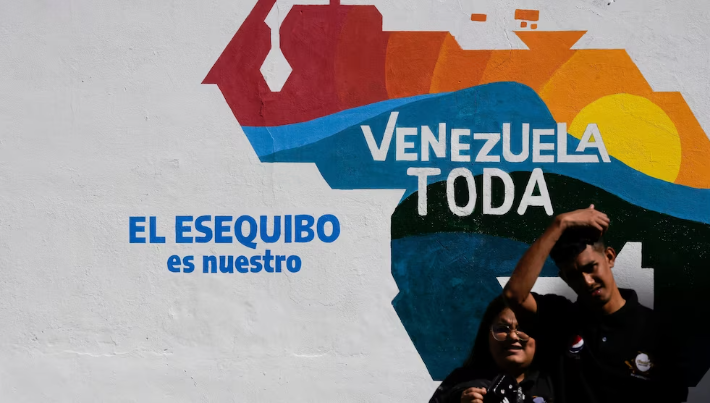
(AP, 1.Dec.2023) — The United Nations’ top court on Friday ordered Venezuela not to take any action that would alter Guyana’s control over a disputed territory, but did not specifically ban Venezuela from holding its planned referendum Sunday on the territory’s future.
Guyana had asked the International Court of Justice to order a halt to parts of the vote, saying it was aimed at paving the way for Venezuela to annex the disputed Essequibo region, which makes up some two-thirds of Guyana.
Both countries interpreted Friday’s ruling as largely backing their own positions on the territory, which is larger than Greece and is rich in oil and minerals.
The court order falls short of any explicit mention of the referendum, but says that Venezuela must “refrain from taking any action which would modify that situation that currently prevails” in Essequibo. The legally binding ruling remains in place until a case brought by Guyana against Venezuela on the region’s future is considered by the court, which could take years.
In comments explaining the verdict, Court President Joan E. Donoghue said that Friday’s order was necessary because “Venezuela’s expressed readiness to take action” on the disputed territory “at any moment following the referendum” showed that there is “a real and imminent risk of irreparable prejudice to Guyana’s plausible right before the court gives its final decision.”
Venezuela has arranged a referendum to ask voters five questions Sunday, including whether to create a Venezuelan state in Essequibo and whether voters support granting Venezuelan citizenship to the region’s current and future residents.
Venezuela does not recognize the U.N. panel’s jurisdiction over the decades-old dispute, but the country’s Vice President Delcy Rodríguez nonetheless characterized the ruling as a “victory for Venezuela,” given that the U.N. did not order a halt to the referendum plans.
“Guyana went looking for wool and came out sheared,” Rodríguez told reporters in Caracas after the ruling was announced.
Guyana President Mohamed Irfaan Ali also welcomed the ruling. He said in a statement that the decision makes clear that “Venezuela is prohibited from annexing or trespassing upon Guyanese territory or taking any other actions” altering the Essequibo’s boundary set in 1899, regardless of the outcome of any referendum.
At urgent hearings in November, lawyers for Guyana said the referendum was designed to prepare for a land-grab by Venezuela. “This is a textbook example of annexation,” Paul Reichler, an American lawyer representing Guyana, told judges at the hearings.
Venezuelan President Nicolás Maduro and his allies are encouraging voters to answer “yes” to all the questions in Sunday’s referendum. Venezuela has always considered Essequibo as its own because the region was within its boundaries during the Spanish colonial period, and it has long disputed the border decided by international arbitrators in 1899, when Guyana was still a British colony.
After years of fruitless mediation, Guyana went to the world court in 2018, asking judges to rule that the 1899 border decision is valid and binding. Venezuela argues that a 1966 agreement to resolve the dispute effectively nullified the original arbitration.
The court has ruled the case is admissible and that it has jurisdiction, but it is expected to take years to reach a final decision.
____________________
By Mike Corder and Regina Garcia Cano. Garcia Cano reported from Mexico City.

